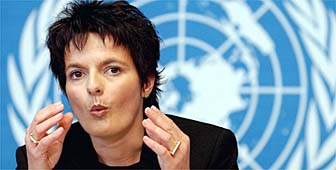
Refugee rights in spotlight

Over 120 countries have voiced their support for the UN convention on refugees, but it remains to be seen whether they will implement it.
Ministers from signatory states to the convention made the pledge at a conference in Geneva, marking the 50th anniversary of the United Nations Convention on Refugees.
Those attending the meeting stopped short of agreeing on strengthening protection for refugees through a verification mechanism. They merely reaffirmed their support for the principles of the convention.
Nevertheless, the Swiss justice minister, Ruth Metzler, who chaired the conference hailed it as a success.
“You only have to look at the world today to see that the convention has lost none of its relevance,” said Metzler. She said she hoped the declaration issued at the end of the conference would give the convention fresh momentum.
Implementation
However, the head of the UN High Commissioner for Refugees, Ruud Lubbers, struck a more downbeat note: “No one is questioning the validity of the convention, the problem is with the implementation.”
The former Dutch prime minister said many states were unhappy about the obligations the 1951 convention imposes on them.
The conference, organised largely as a symbolic reaffirmation by the international community of the rights of refugees, has been overshadowed by a toughening up of asylum policy in a number of western countries, especially in the wake of the September 11 attacks in the United States.
Indeed, Metzler warned that the fight against terrorism should not be used as an excuse to restrict the rights of refugees. She added that countries faced with economic migrants should not reinterpret the convention in a more restrictive way.
Despite this apparently enlightened view, a number of human rights groups are concerned that a review currently being carried out by Metzler’s department may lead to a hardening of Swiss asylum law.
Moral pressure
The fact that 80 ministers took part in the conference is being seen as a major success. But everyone was aware that many, while using the rhetoric of tolerance in Geneva, are delivering a different message to their domestic audience.
“There’s strong moral pressure on ministers. If they have come here and publicly declared they will stick to the convention, they can be held to account if they then do not apply it at home,” says Jean-Daniel Gerber, head of the Swiss Federal Refugee Office.
The Australian immigration minister, Phillip Ruddock, took the hardest line at the conference, questioning the UNHCR’s figure of 21 million refugees worldwide, and suggesting that it contains a great many economic migrants.
Gerber agrees that there is a problem of separating genuine asylum seekers from economic migrants, but he says Switzerland disagrees with the methods Australia is using to solve the problem.
“The convention is there for protection. It shouldn’t be used to control migration,” Gerber told swissinfo.
Lubbers agreed that there should be proper screening of immigrants, but said the refugees should not be seen as a threat. He criticised Australia for having “gone too far” in turning away refugees.
Burden-sharing
“We shouldn’t be protecting ourselves from refugees – we should be protecting the refugees,” the UNHCR head said.
“Refugees are not only a burden. They are potentially valuable citizens with a contribution to make,” he added.
However bad industrialised countries may feel the refugee situation has become for them, it is the developing world that continues to bear the brunt of the refugee problem, and one of the key phrases used by Lubbers was that of “burden-sharing”.
“We have to do more together to keep this system intact,” he says.
Jean-Daniel Gerber agrees, and says the developed world can do its bit by boosting development aid to the South and ensuring that the UNHCR is properly funded.
by Roy Probert

In compliance with the JTI standards
More: SWI swissinfo.ch certified by the Journalism Trust Initiative



























You can find an overview of ongoing debates with our journalists here . Please join us!
If you want to start a conversation about a topic raised in this article or want to report factual errors, email us at english@swissinfo.ch.